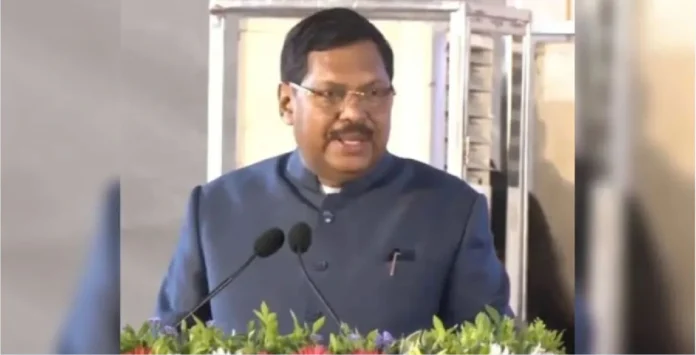By Binny Yadav
When the moral and constitutional idealism of Mahatma Gandhi and Dr BR Ambedkar faces its sternest trials in modern India, their philosophies continue to guide the Republic’s conscience. Gandhi’s conviction that “there is a higher court than courts of justice—the court of conscience” and Ambedkar’s insistence on constitutional morality together form the twin pillars of India’s moral architecture.
Their combined vision offers a timeless warning: when law is stripped of moral purpose, it mutates into an instrument of oppression. The convergence of Gandhian ethics and Ambedkarite rationalism underscores a simple truth—that every law, however well-intentioned, must be continuously examined through the lens of justice and humanity.
It was this enduring relationship between legality and morality that Chief Justice of India (CJI) BR Gavai evoked in his recent address in Mauritius. “It is important to remember,” he said, “that just because something is legalised, it does not mean it is just.”
Drawing on examples from slavery in America to India’s colonial-era Criminal Tribes Act and sedition laws, CJI Gavai reminded that legality has too often been the refuge of moral failure. To illustrate how the Supreme Court has sought to prevent such regressions, he cited four landmark judgments—milestones in the judiciary’s journey from procedural legality to substantive justice.
FOUR JUDGMENTS WHERE JUSTICE TRIUMPHED OVER LEGALITY
1. Shayara Bano vs Union of India (2017): Personal Law And Constitutional Morality
By declaring Talaq-e-Bidat (instant triple talaq) unconstitutional, the Supreme Court reaffirmed that personal faith cannot override fundamental rights. The verdict dismantled a patriarchal practice that allowed unilateral divorce by men without recourse for women—deeming it arbitrary and violative of equality. The ruling enshrined the principle that personal laws must also bow before the Constitution’s moral compass—equality and dignity.
2. Joseph Shine vs Union of India (2018): Decriminalising Adultery
In striking down Section 497 of the IPC, the Court dismantled a colonial relic that treated women as the property of their husbands. The judgment elevated gender justice by declaring that the state has no role in policing consensual adult relationships. What society may deem immoral, the Court ruled, cannot automatically be rendered criminal by law.
3. Bilkis Yakub Rasool vs Union of India (2024): Justice For The Marginalised
When the remission granted to 11 convicts in the Bilkis Bano case was annulled, the Court declared the Gujarat government’s action a “fraud on power”. The ruling sent a clear message: legal technicalities cannot sanctify injustice. In setting aside the remission, the Court restored faith in the idea that legality without morality is tyranny—a verdict steeped as much in courage as in law.
4. Association for Democratic Reforms vs Union of India (2024): Unmasking Political Secrecy
By striking down the Electoral Bonds Scheme, the Supreme Court reaffirmed that democracy survives on transparency. Anonymous political funding, it ruled, violated the citizen’s right to know and distorted electoral equality. Here, the judiciary reclaimed the principle that democracy’s legitimacy flows not from opaque legality, but from visible integrity.
CJI Gavai’s reference to these cases was not mere judicial nostalgia—it marked a philosophical evolution. Justice, he suggested, cannot be mechanical; it must be moral. The Supreme Court’s recent jurisprudence reflects a deliberate humanisation of the law, where dignity, empathy, and equity outweigh the cold precision of statutes.
Two more transformative verdicts further underscore this moral turn:
- Navtej Singh Johar vs Union of India, 2018: Section 377 Verdict
Decriminalising same-sex relations, the Court freed individuals from the tyranny of societal morality. Justice DY Chandrachud noted that constitutional morality must prevail over majoritarian sentiment—a reminder that popular opinion can never be the measure of justice.
- KS Puttaswamy vs Union of India, 2017): The Privacy Verdict
By recognising privacy as a fundamental right, the Court expanded the scope of liberty and dignity. It declared that privacy and autonomy are not state-given privileges, but inalienable human rights. The ruling drew the boundary where the law must stop—at the threshold of individual dignity.
In recent hearings—from demanding accountability in the Manipur violence cases to questioning unchecked surveillance—the Supreme Court has reinforced an elemental truth: justice must not only be done, it must be seen to be done. Legality cannot become the veil for impunity.
Both Gandhi and Ambedkar warned against equating legality with righteousness. Gandhi’s Satyagraha was a moral rebellion against unjust laws, while Ambedkar’s constitutional morality sought to embed ethics into governance. Their philosophies converge in CJI Gavai’s reminder that law must serve as the conscience of the Republic, not merely its controller.
In times when political majorities risk sanctifying inequity in the name of legality, the judiciary’s duty—as Gavai underscored—is to act as the nation’s moral circuit breaker, ensuring that justice prevails where legality falters.
THE LAW MUST FEEL, NOT JUST FUNCTION
The Supreme Court’s trajectory—from Shayara Bano to Bilkis Bano and electoral bonds—reflects a conscious attempt to humanise justice. Gandhi envisioned it; Ambedkar codified it. Their ideals, revived through judicial conscience, remind us that justice is not born of legality—it is legality’s moral evolution.
As India navigates the uneasy tension between what is legal and what is right, CJI Gavai’s words ring with renewed urgency: laws alone do not create justice; it is justice that gives life and meaning to the law.
In the end, a Republic endures not on the weight of its statutes, but on the strength of its conscience.
—The writer is a New Delhi-based journalist, lawyer and trained mediator


